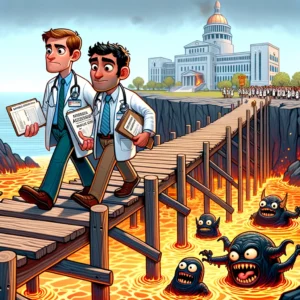
With the AMCAS portal opening May 1, many medical school applicants have already begun this process in earnest. Of all the graduate and professional schools, medical school has the most intense, time-consuming, and onerous application, and changes to it can send shivers of panic up the collective spines of aspiring physicians. Not to worry, at Gurufi, we have nearly 15 years of experience helping applicants earn admission to their top choice medical schools. We’re here to help!
Here are some of the changes to this year’s AMCAS that you need to be aware of. These changes reflect a broader shift toward a more holistic review process. As such, in addition to noting specific things you should be aware of, also note how these changes are strong indicators of how much admissions committees care more and more about whether applicants have demonstrated leadership, care about public health, and have a service-oriented mindset when it comes to medicine as a career. Thus, these changes aim to capture a wider array of applicant experiences, providing admissions committees with a deeper understanding of candidates’ backgrounds, experiences, and motivations.
- 1. Social Justice/Advocacy Experience Type
One of the most notable additions to the AMCAS application is the new Social Justice/Advocacy experience type in the Work & Activities section. This category allows applicants to highlight their involvement in social justice or advocacy efforts, demonstrating their commitment to advancing the rights, privileges, or opportunities of a person, group, or cause. Examples of activities that fall under this category include registering people to vote, advocating for civil rights, reducing health inequities, addressing food deserts, or advocating for vulnerable populations such as children or the homeless.
Note that this doesn’t necessarily have to be healthcare-related social justice work, as the above list indicates. Medical schools recognize that doctors must be prepared to work with diverse populations and advocate for health equity. By including this experience type, the AMCAS application aligns with the values of medical schools that seek to produce physicians who are not only clinically competent but also socially conscious and dedicated to addressing systemic issues.
Practical Advice: considering using one of your “Most Significant” entries so that you can have an additional 1325 characters to explain, at length, what you did, why it was important to you, what you learned, and perhaps how you think this work has given you an important perspective on the kind of doctor you aspire to become.
- Replacement of the “Disadvantaged Status” Question with “Other Impactful Experiences”
The second major change to the AMCAS application is the replacement of the Disadvantaged Status question with the Other Impactful Experiences question. This new question aims to promote a holistic review by allowing applicants to provide additional context about the challenges they may have experienced in their lives. The Other Impactful Experiences question is designed for applicants who have faced or overcome challenges in various areas, such as family background, financial circumstances, community setting, education, religion, or other life experiences.
This change provides a broader scope for applicants to share their unique stories and backgrounds, allowing admissions committees to better understand the hurdles they may have overcome. It also reduces the stigma associated with the term “disadvantaged” and offers a more inclusive platform for applicants to express their personal journeys and resilience.
Practical Advice: Any time you are discussing status, you want to make sure that you go beyond describing the status. Ultimately, the idea that you hope to convey is that a particular status is connected to experiences, worldviews, certain kinds of empathies, and connections to causes or problems that are personal to you. This is partly a function of wanting to make sure you convey yourself as a compelling candidate and partly a function of schools wanting to make sure that they remain on the right side of the law vis-à-vis new affirmative action rulings by the US Supreme Court.
- Addition of Drop-Down Categories for the Institutional Action Question
The third change involves the Institutional Action question, where applicants must report any disciplinary or academic issues they faced during their undergraduate education. Previously, this question was open-ended, but the new format includes a drop-down menu allowing applicants to select “Conduct,” “Academic,” or “Both.” This change aims to provide a more comprehensive view of any institutional action and allows applicants to categorize the nature of the issues they encountered.
The addition of drop-down categories provides more clarity and context for admissions committees. It helps them better understand the type of institutional action, reducing ambiguity and promoting a fairer assessment of applicants with disciplinary or academic histories.
Practical advice: We have written extensively about how to address missteps in your medical school applications. Check out these shorts, here, here, and here (this was done for MBA applicants, but the ideas are the same!):
- Optional Field for AAMC PREview® Exam Registration Date
The final change to the AMCAS application is the inclusion of an optional field to indicate an upcoming AAMC PREview® exam registration date. This addition allows applicants to indicate their intention to take the PREview exam, providing medical schools with information on when they can expect the score .
The AAMC PREview® exam assesses applicants’ pre-professional competencies and is designed to help admissions committees evaluate candidates’ readiness for medical school. By including this optional field, the AMCAS application aligns with the growing importance of the PREview exam in the admissions process, allowing schools to plan accordingly for the evaluation of these scores.
Remember, though these changes are important, the underlying components of a strong application remain the same. Take these changes into account as you craft your personal statement, Work & Activities, and secondaries. And, if you need help with these vital documents, Gurufi’s editors collectively have more than 50 years of experience helping students earn admission into the top medical schools in the country! Check us out today.
For more help with your personal statement, check us out at Gurufi.com. Our personal statement editors and consultants have decades of experience helping clients get into top medical schools. Our specialty is helping you craft compelling personal statements that move the needle in your admissions process! For questions, shoot us an email at service@gurufi.com. Check us out on Facebook, Twitter, and LinkedIn.








